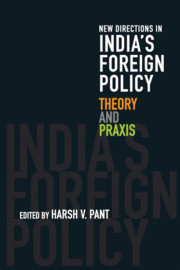Book contents
- Frontmatter
- Contents
- Preface
- 1 Introduction
- Part I Theoretical Evolution
- 2 Power and Indian Foreign Policy
- 3 Constructivism and Indian Foreign Policy
- 4 Exploring Historical Memory and Indian Foreign Policy
- 5 A Doubled Geography: Geobody, Land and Sea in Indian Security Thought
- 6 Foreign Policy Analysis and Indian Foreign Policy
- Part II Emerging Themes
- Bibliography
- Contributors
- Index
2 - Power and Indian Foreign Policy
from Part I - Theoretical Evolution
Published online by Cambridge University Press: 13 November 2018
- Frontmatter
- Contents
- Preface
- 1 Introduction
- Part I Theoretical Evolution
- 2 Power and Indian Foreign Policy
- 3 Constructivism and Indian Foreign Policy
- 4 Exploring Historical Memory and Indian Foreign Policy
- 5 A Doubled Geography: Geobody, Land and Sea in Indian Security Thought
- 6 Foreign Policy Analysis and Indian Foreign Policy
- Part II Emerging Themes
- Bibliography
- Contributors
- Index
Summary
Power is not a new concept in the study of Indian foreign policy. Like Indian policymakers, scholars of Indian foreign policy have long displayed a sophisticated understanding of its role and function in international relations. Moreover, there has been a clear evolution in the way scholars have treated the concept, an evolution that roughly tracks changes in India's capabilities over time and has been sensitive to major developments in India's external relations. In the wider realm of world politics, the nature of power itself has changed over the last seven decades due to technological change, globalization and the shifting distribution of capabilities across states in the international system. Today, the world stands at an unprecedented threshold, not quite unipolar and not quite multipolar, with global power transitions taking place in the shadow of nuclear weapons.
As a rising power with nuclear weapons and multiple security challenges in its neighbourhood, India is likely to play a pivotal role in shaping scholarly understandings of power and its limits in the twenty-first century. Equally, it will be vital for Indian decision-makers to develop the appropriate theoretical tools to address new challenges to state capabilities and the changed landscape of opportunities to most efficiently achieve their external objectives. The foundational instruments of statecraft such as deterrence, balancing, diplomacy and war take on different meanings depending on the underlying conception of power on which they are premised. If the nature of power changes, then states that fail to update their conceptions of these instruments risk significant losses.
The questions this chapter examines therefore pertain to the manner in which the study of Indian foreign policy has dealt with power. Drawing on debates over power in the wider international relations literature, the chapter asks of the Indian context: Is power purely based on capabilities or is it relational? Where does power come from? Is power essentially zero-sum in nature or can it be positive-sum? Is the pursuit of power – or power politics – rational and/or legitimate? What are the existing gaps and blind spots in the study of power in the context of Indian foreign policy? Answers to these questions provide a coherent picture of the evolution of the study of power and Indian foreign policy, while also charting a course for future research.
- Type
- Chapter
- Information
- New Directions in India's Foreign PolicyTheory and Praxis, pp. 23 - 47Publisher: Cambridge University PressPrint publication year: 2019



